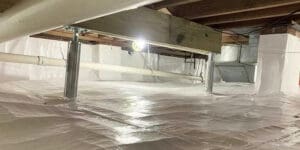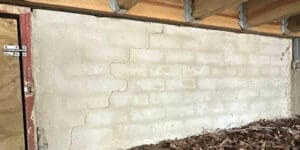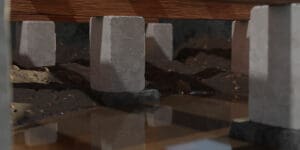In many homes, a leaky basement is a regular occurrence. When a basement leaks, it doesn’t necessarily mean that the house was poorly constructed or that some calamity has occurred; most often, it’s just a combination of time and natural forces, but some manufactured elements can cause or aggravate a leaky basement.
Any foundation can leak, and reinforced concrete foundations are no less hazardous than masonry foundations they leak in various ways. In fact, all that can be stated about basement leaks also applies to a crawl space, which is nothing more than a short basement with a dirt floor.
It’s crucial to understand that there are causes and sources of leaks while investigating why a basement leaks. The first is frequently caused by natural events outside the basement, while the second is caused by defects or interruptions in the foundation’s structure. Both must work together for the basement to leak, and any solution to correcting the leak must consider both.
What are the Common Symptoms of a Leaking Basement?
A leaking basement isn’t usually as evident as stagnant water in the center of your floor, and even minor leaks can cause substantial damage if left unnoticed. Fortunately, if you know what to look for, any moisture issues you may have will be easy to see.
Here are the common signs of a leaking basement:
WATER STAINS ON WALLS, FLOORS, AND CEILINGS
Water leaking into your basement through breaches in the walls, windows, or the ceiling will almost certainly create stains. These stains might be yellow, white, or grey, and they all indicate that you should contact a foundation repair expert.
SPALLING OF CONCRETE, BRICK, OR STONE
When concrete is damaged by water, it can flake or strip away. The salt layers that water leaves beneath the surface generate this. If your basement or foundation walls are crumbling due to water damage, you should act quickly to prevent structural damage.
MOLD GROWTH
Mold grows and thrives in moist and damp environments and is frequently a sign of a leaking basement. If you suspect mold growth, you should have it checked by a specialist to ensure that you and your family are safe. A mold test can establish what type of mold you have and whether it is dangerous to your health.
DAMP OR MUSTY ODOR
It’s natural for basements to smell different from the rest of your house mainly if they’re merely used for storage but they shouldn’t smell musty or damp. Even if there are no general symptoms of water, it’s a good idea to get your basement evaluated for leaks.
HIGHER HUMIDITY LEVELS
Excess moisture might contribute to higher humidity levels. Because humidity reduces the efficiency of your heating and cooling systems, you may observe an increase in your utility expenses if you have a leaking basement.
How to Keep Water Out of Your Basement
INSTALL GUTTER EXTENSIONS
If your gutters are dumping water less than 5 feet from your house, use metal or plastic gutter extensions to redirect the water further out.
On the other hand, extensions aren’t the most attractive or practical long-term method, especially if you are always prone to tumbling over them or running over them with a lawnmower. In addition, the continuous underground drain pipe is unseen and capable of transporting significant amounts of gutter runoff far away from your home.
FILL IN THE CRACKS
If water leaks into the basement from cracks or crevices around plumbing lines, you can use polyurethane caulk and hydraulic cement to seal the breaches.
Plugs work when the problem is just a hole through which water oozes, such as surface runoff or damp soil. Groundwater is likely the problem if the water rises through the floor or at the seam where the floor and walls meet, therefore, plugs will not solve the problem.
DRAINS FOR THE FOUNDATION MUST BE REPAIRED
Hydrostatic pressure pulls water up from the earth, causing water to leak into your basement low on the walls or at the joints where walls meet the floor.
Learn more about drainage here:
First, see if you have footing drains, underground pipes that take water away from the foundation and are installed when the house was built. (Look for a clean out pipe capped a few inches above the floor or a maintenance hole or drain in the basement floor.)
REMAKE THE TERRAIN
Because your home’s siding somewhat overflows its base, building up the crown could bring soil and decay and termites too close to the siding for comfort. The minimum safe distance is 6 inches. Create a berm (a mound of earth) or a swale (a broad, shallow ditch) to channel water long before it extends and reaches your house in this situation.
INSTALL A SUMP PUMP
You will have to channel subsurface water from the inside if you can’t even keep it out.
Saw a channel all around the floor’s perimeter, scratched out the concrete, and install perforated pipe in the hole to form an interior drain system. The line empties into a collection tank at the basement’s lowest point, where a sump pump pumps it out.
INSTALL A CURTAIN DRAIN
Install a curtain drain to redirect water going underground toward your house if you don’t have working footing drains.
Curtain drains are a French drain consisting of a shallow trench filled with gravel and perforated piping that prevents water upstream of your home and carries it down the slope a certain distance away.
WATERPROOF THE WALLS
Installing an interior drainage system eliminates the water but does not make the walls waterproof. You’ll need an external system for that, which includes a French drain to relieve hydrostatic pressure and exterior waterproofing to safeguard the foundation.
Watch our video on exterior waterproofing to learn more:
It’s a significant task requiring excavation around the house, but it might be the best option if you have a foundation with several cracks and gaps. It also keeps the debris and water out of the finished basement, which may be the best option if you would not want to tear it up.
Flooding in the basement is a nightmare for homeowners. It has the potential to harm your belongings, damage your home’s foundation, and create an unhealthy climate conducive to mold growth. If you don’t react promptly to remove the water from the space, a flooded basement not only destroys your valuables but also creates an atmosphere where mold can rapidly grow.
Because you waited too long to act, you’ll have to spend extra money on cleanup activities or perhaps emergency repairs like structural damage repair or foundation repair services.
Contact HydroHelp911 for a Free Inspection
You may not have time for such nonsense, but we do! We understand how critical it is to get back on track fast after a crisis, which is why our crew will be there when you need us the most. Contact us today at 704-741-9737 for a free inspection.
HOW DO YOU FIX A LEAKING BASEMENT EXTERNALLY?
French drains and footing drains are examples of external drain systems that can direct water away from your property’s foundation. Ideally, the land leveling around your home would usually direct water away from the house to prevent it from accumulating around foundation walls. However, when the perfect slope or grading isn’t possible, HydroHelp911 may assist homeowners in installing outside drainage systems as the first line of defense against hydrostatic pressure.
HOW TO REPAIR A LEAKY BASEMENT FROM THE INSIDE?
Water and moisture that has made it to the basement is pumped out by internal drainage systems. In properties where groundwater is an issue, HydroHelp911 installs lifetime warrantied interior drain tiles. Drain tiles absorb water that leaks through foundation walls and direct it to a sump pump, which pumps and redirects water out and away from your house.
WHAT IS CAUSING THE WATER TO RISE THROUGH MY FLOOR?
Leaks in the ceiling or breaches in the home’s exterior are two common causes of water intrusion. If water seeps through the floor, it could be due to poorly sealed foundations or foundation floor fractures.




